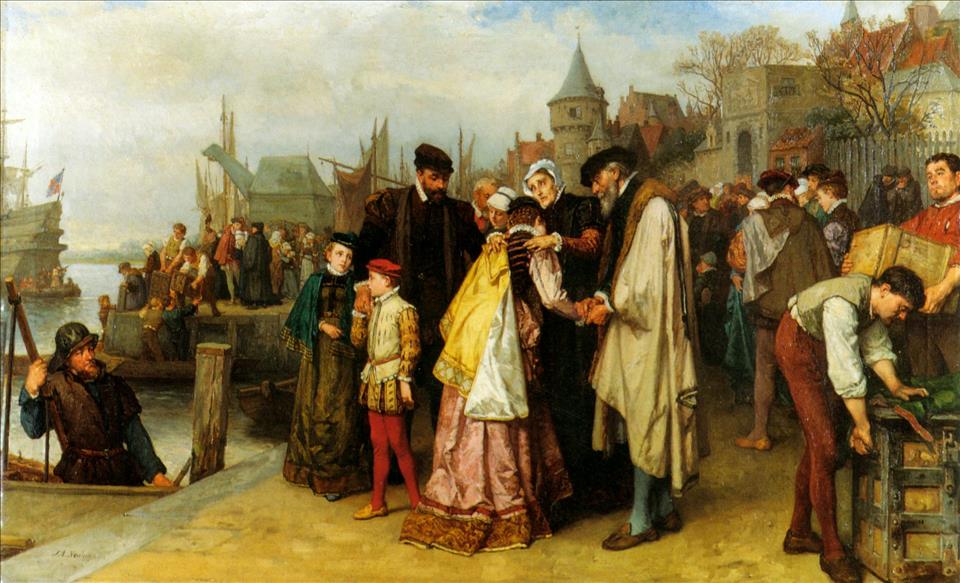
This 16Th-Century Law Was England's First 'Refugee Policy'
The idea that those fleeing religious persecution in early modernity were in some way happier than modern refugees is often linked to the idea that there were no border controls.
This is, to some extent, true – there was no meaningful system of international border control in 16th-century England. And there were no laws or guards to prevent someone from entering and settling in a new country.
But migrants were subject to border control within England itself, which took several forms. The English parliament passed laws restricting migrants from setting up in trade in 1523, 1529 and 1530. These laws culminated in the 1540 Act Concerning Strangers , which meant most migrants could not legally work.
Legal handbooks from the time, which I am studying in my PhD research, described limitations on migrants' ability to hold or bequeath property, as well as their limited standing in court. They also noted that migrants were subject to the laws of the land if they committed a crime. This principle was affirmed by Courteen's Case, a 1618 case concerning Dutch merchants, in which a judge ruled that migrants living in England could be tried for crimes committed there.
Despite these restrictions, the crown did sometimes recognise the persecution of these 16th-century Dutch migrants, and gave some of them a level of protection. However, these were“privileges” – not the same as the rights that English subjects enjoyed.
In 1550, Edward VI granted migrants the use of the “Stranger Church” , a space in which to worship in their own languages and out of conformity with the Church of England. The crown also took surveys of the “returns of aliens” from 1560 onwards – to find out whether migrants had arrived“uppon pretence of fleeing for persequcon for ye cause of relligon”.
Despite this recognition, internal barriers to settlement remained in place. The majority of migrants settled in London, and it is clear from archival documents that they were frequently prosecuted under the 1540 Act for working. As a group of Dutch immigrants complained in 1560:
A new life in EnglandSome who fled religious persecution were invited by towns such as Norwich and Canterbury to settle. Migrants were constituted as a separate community: permission to settle was tied to living in specific places, in specific numbers, and their rights of trade and manufacture were limited to specific goods.
Perhaps more importantly, these settlements were established under letters patent – legal instruments which did not have the same power as statutes. This meant the migrants in these communities could still be prosecuted under the 1540 Act Concerning Strangers.
Letters patent were also temporary, renewable on the death of each monarch. Flurries of letters between migrant communities on the death of Elizabeth I show just how anxious these communities were that their limited privileges might be revoked.
In 1616, Dutch migrants in Norwich complained that, despite having been settled as a community for over 50 years, they suffered“greevous molestations” on the grounds of“certaine ancient Actes and Statuts, whereby Strangers are forbidden to keepe house and use their severall crafts”.
Like some migrants today, many lived precariously, sometimes getting away with illegal working or, if they had the right connections, receiving protection from powerful people. They wanted the laws revoked and to receive proper protection in recognition of their persecution.
Refugees near the Croatia-Serbia border in 2015. BalkansCat/Shutterstock
But the law persisted. In 1685, around 50,000 Huguenots arrived in England fleeing persecution in France, to find that despite an outpouring of charitable donations, they were still unable to meaningfully settle due to statutes like the 1540 Act.
For 40 years, debate raged about whether a law should be passed for a“general naturalisation”. This would be a cheap and easy way for the Huguenots to become English subjects and overcome the restrictions faced by other persecuted migrants.
This debate culminated in the passage of the Foreign Protestants Naturalisation Act in 1708 . But it was revoked in 1712 when the government became worried it had encouraged thousands of German “poor Palatines” to emigrate to England.
Protecting refugees todayOf course, we cannot judge laws from 1540 by today's standards. But it is striking how many similar debates are ongoing about whether those fleeing persecution should be offered protection, and what rights they should have in a host country. As I'm finding in my research, the idea that early modern refugees were necessarily“happier” than today's refugees is wrong.
Modern refugee policies hinge on the idea that those fleeing persecution have a right to protection. This was not part of considerations when the Act Concerning Strangers was passed. It was perhaps not until the provisions of the 1951 UN Convention that those seeking sanctuary in England could be guaranteed protection and meaningful settlement.
Today, this right is under threat and imperfectly recognised in many countries around the world. But in theory, it is a guarantee that people will not be returned to harmful situations they have left, and have rights in the country in which they settle.

Legal Disclaimer:
MENAFN provides the
information “as is” without warranty of any kind. We do not accept
any responsibility or liability for the accuracy, content, images,
videos, licenses, completeness, legality, or reliability of the information
contained in this article. If you have any complaints or copyright
issues related to this article, kindly contact the provider above.
















Comments
No comment